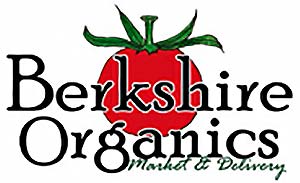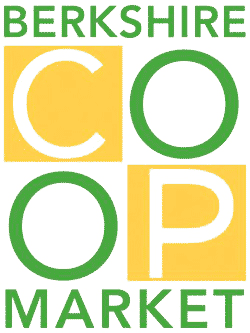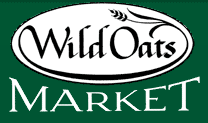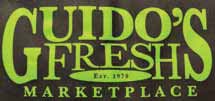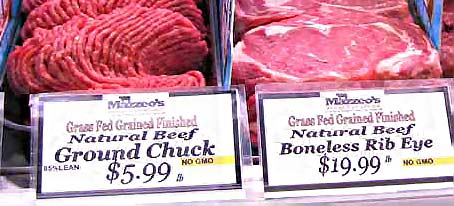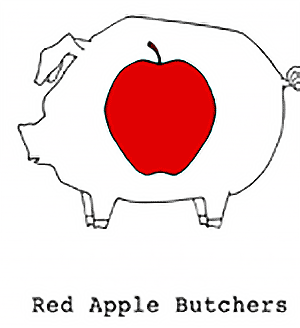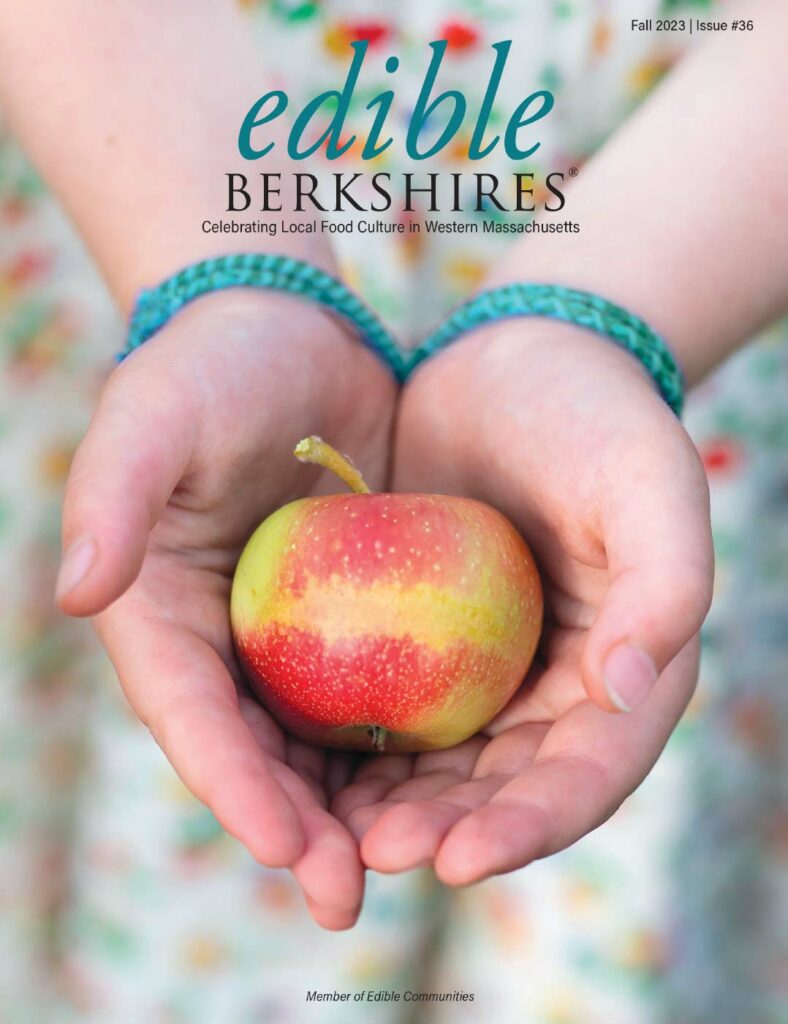Uncertainty Adds to Berkshires’ Concerns
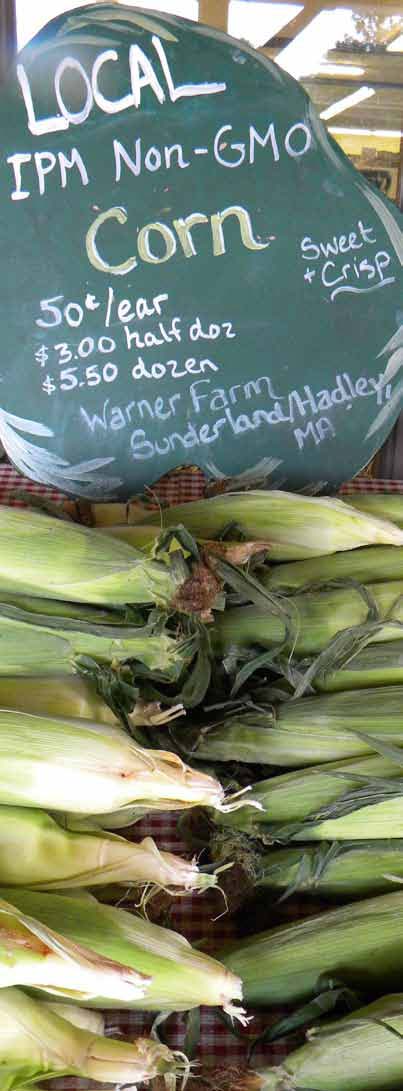
Berkshire Organics, IPM, integrated pest management, is a process
used to solve pest problems while minimizing risks
to people and the environment. UCDavis.edu
By Judith Lerner
Why all the fuss about genetically modified organisms (GMOs)? Plants and animals used for food, medicine and personal care are being perfected, bred and hybridized all the time. Isn’t genetic modification just a more modern and efficient method?
Well, no. Well, not at all.
Traditional breeding enhances and strengthens the best natural characteristics of an organism by bringing highestquality specimens together over generations to develop qualities already present. GMOs, (or GEOs, genetically engineered organisms) have their genetic material, their DNA, modified in a laboratory in ways that cannot happen in nature. Pesticides and antibiotics are built into seeds; animal DNA is spliced into plants and vice versa.
Brian Gibbons, a horticulturist and co-owner with his wife, Aleisha, of Berkshire Organics, a store and organic food delivery service in Dalton, explained the difference: “The natural way plants reproduce is through pollination, the transfer of pollen from male flower parts to female flower parts, producing a fruit or vegetable. Inside the fruit is the seed that contains the new genetic material for the next generation if you grow the plant from this seed. That’s how new plants can form.”
Not through laboratory-created, -controlled and re-created, patented seeds.
Massachusetts GMO Right to Know, a statewide network of advocates for GMO labeling, defines GMOs—short form—as “Plants or animals created through gene splicing, an experimental technology which merges DNA from different species including a combinations of plant, animal, bacterial and viral genes to create an organism that cannot occur in nature or through traditional crossbreeding.”
Early in 2012, Berkshire Organics Administrative Coordinator Blanche Lennington began researching which of their products contain GMOs and which do not.
Since then, Berkshire Organics has discontinued brands they find or suspect contain GMOs and replaced them with similar non-GMO products wherever possible, and labeled any products they carry that might or do contain GM ingredients.
GMO ingredients can be found in over 70% of conventionally grown and processed, packaged foods. These ingredients include alfalfa, canola oil, corn (including sweet corn but not popcorn), cotton, Hawaiian papaya, soy, sugar beets, zucchini and yellow squash. Salmon and apples may be next.
Other foods that have been approved by the FDA or are being considered for approval for genetic engineering include flax, plums, potato, radicchio, rice, tomato, wheat and new varieties of corn and soybeans. The Organic Consumers Association said there are “30 new GMO crops coming down the pipeline.” “Things like distilled white vinegar, which is made from corn, is just one example,” Lennington said.
“Every time I have to explain to a customer why we are not carrying something, they appreciate that,” she continued. “We work very hard to find a clean alternative for them if this product contains GMOs or potentially contains GMOs.”
Berkshire Organics keeps their customers up-todate on GMO issues through signage, shelf labeling and in weekly newsletters. They maintain a list of brands verified by the Non-GMO Verification Project, NonGMOProject.org. They are in the forefront in educating the public and supporting the labeling of GMOs.
They are the most thorough but they are not alone, here. Berkshire retailers concerned and educating about GMOs include Berkshire Co-op Market and The Meat Market, both in Great Barrington; Guido’s Fresh Marketplace in Great Barrington and Pittsfield; Lenox Natural Foods; Pittsfield Health Food Centre; Wild Oats Market in Williamstown; and Hawthorne Valley Farm Store in Ghent, NY.
These businesses say they do not knowingly sell or use products from companies using GMOs, even from their organic subsidiaries—General Mills owns Cascadian Farm and Muir Glen; Coca-Cola owns Odwalla; Group Danone owns Stonyfield Organics. They do not add new items with known or suspected GMOs, although local products might get less scrutiny.
Massachusetts Right to Know GMO formed in January 2013 to build support for mandatory GMO labeling laws in the state. Their advocacy was instrumental in getting all the Berkshire legislators to support and vote for those labeling bills earlier this year. It was crucial in getting so many legislators statewide—119 representatives, 146 legislators total—to support bills now in the house to mandate the labeling of GM ingredients on all food packaging.
As of this writing, at least 25 states are working on laws to label GMOs including bills awaiting passage in the Massachusetts, New Hampshire, New Jersey, New York, Pennsylvania and Rhode Island legislatures.
Vermont has passed a mandatory GMO labeling bill and is being sued by four packaged food industry groups. Connecticut and Maine passed bills that need other contiguous states passing GMO labeling bills to trigger their going into effect.
Third district State Representative Tricia Farley- Bouvier of Pittsfield endorsed mandatory GMO labeling in Massachusetts when the bill was first filed by State Representative Ellen Story of Amherst in January 2013.
“The momentum had been remarkable in the last 18 months,” Farley-Bouvier said in July before Bill H.3996 died in committee. She added that Representative Story told her that she had been filing a GMO labeling bill for years and it has always gone nowhere.
“It has everything to do with the grass roots. This is a classic example of the effectiveness of grass roots activity.” She said she hears from many Berkshire County people about the issue, “and that’s great!”
Berkshire County’s State Senator Benjamin Downing said he was not originally a sponsor. Speaking with a number of MA Right to Know GMO members persuaded him to add his support to GMO labeling bills. “They were very clear and persuasive. Speaking with them, I realized why the GMO-labeling issue is important for Massachusetts.”
“I’m a co-sponsor,” said fourth district State
Representative William “Smitty” Pignatelli. Second district State Representative Paul W. Mark is also a sponsor and has been a supporter since labeling initiatives began a couple of years ago. First district State Representative Gailanne M. Cariddi said she supported the labeling legislation. She sees labeling as a first step. She then endorses education so that people actually read the label.
“GMO labeling is something that is very important to my constituents,” Cariddi said. “I get emails about it almost daily.” GMO-labeling opponents could not have defeated the Massachusetts bill in a vote since an overwhelming majority of legislators supported it this session. But defeat it they did by preventing it from coming out of the Ways & Means committee to move onto the House floor for a vote.
No vote, no GMO labeling.
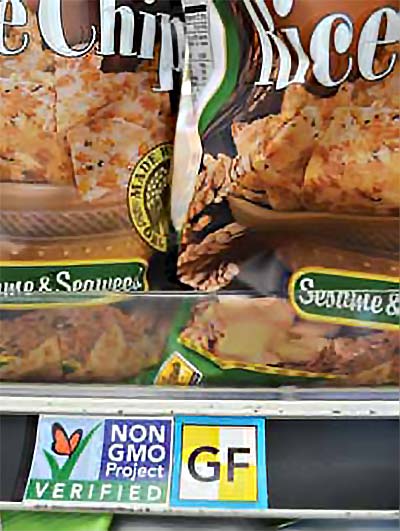
Berkshire Coop labels include nonGMO
and GF (fluten free) when confirmed.
Representative Mark said it technically still has a chance until the end of the year in informal session. But now, an objection from even a single representative can table a bill and again prevent it from coming to the House floor for a vote. If the House does vote on and pass a labeling bill, it then has to pass in the Senate.
According to Northeast Organic Farming Association/ NOFA policy director Jack Kittredge, GMO-labeling opponents persuaded key legislators to oppose, and thus defeat, the GMO-labeling bill by ignoring it, by sitting on it, keeping it from a vote during formal session.
Supporters had the numbers. Opponents had the legislative power.
But, two can play like that.
Labeling supporters can be even more effective than they were in this session when a new GMO-labeling bill is filed and moves through the Massachusetts legislature in the upcoming 2015/2016 session. Kittredge told Edible Berkshires he wants to be involved in drafting such a modified bill.
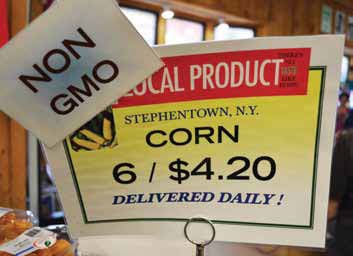
Guido’s, labeled in response to customers’ inquiries
As a new bill moves through the Massachusetts legislature, supporters must reinvigorate the 146 current legislators who already favor mandatory labeling and reach the speaker of the house, the chair of the house and the joint Ways & Means committees and legislators whose constituents fear food prices would go up if Massachusetts law required GMOs to be labeled.
They must show legislators in key positions there is no consensus in the world scientific community that GM foods are nutritious and safe, that GMOs will feed the world, reduce pesticide use and are the same as traditional breeding.
They must at least persuade enough key people to get the 2015 bill to the house floor.
Aleisha Gibbons noted that, “If companies are certified organic I think we can be reasonably sure their products are non-GMO. But we cannot be 100% sure because they are not required to test for GMOs.”
Buying 100% certified organic products is the safest way to avoid hidden GMOs. But products labeled organic can be as little as 70% organic. And then, who knows what else they contain?
Tristan O’Neill, perishable food buyer at Hawthorne Valley Farm Store in Ghent, NY, cautioned, “It can be slipped in where you’re not looking for it if a product is not 100% organic.”
Roberto Lauren, manager of High Lawn Farm dairy in Lee, said it is not easy for him to maintain the standards he has always had. He said the farm does not and never has used pesticides growing the corn, alfalfa and hay they feed their Jersey cows and, as of last fall, they do not use GMO seeds in the corn and alfalfa crops they grow.
But, he said, he has not found a source of guaranteed GMOfree grain mixtures to supplement what the farm grows.
“Even growers who try to be non-GMO sometimes run out of corn or soy or alfalfa so they may unknowingly buy GMO to add,” Lauren said.
He said organic grain mixtures are too expensive for his operation.
For that reason, Matthew Rubiner of Rubiner’s Cheesemongers, Great Barrington, said he wouldn’t even trust non- GMO-verified labels.
“It really boils down to knowing where your food comes from and who makes it,” Rubiner said. He wants to know whether his cheese comes from animals that have eaten genetically modified feed.
Mike Mazzeo of Mazzeo’s Meats in Guido’s Fresh Marketplace said among all his meat and poultry, only one farm, Painted Hills Natural Beef in Wheeler County, Oregon, guarantees that their grass-fed, grain-finished beef is GMO-free since they told him they grow all their own grain. However, the farm’s website has no mention of GMOs.
There is more choice at The Meat Market, Jeremy Stanton’s butcher shop in Great Barrington. They keep a notebook on their front counter detailing how each farmer they buy from raises their animals. Red Apple Butchers, a Berkshire Organics partner owned by James Burden and Jazu Stine, has only been open since May.
They said they do not have a book, but “Just ask at the counter. We know which of the farms we buy our meat from raise their animals on non-GMO feed.”
OK. So, corn. What about corn? ’Tis the season …
I asked Eric Whitney, owner of Whitney’s Farm Market in Cheshire, a popular farm stand with lots of corn they grow in sight of the stand. He said he grows only traditional hybrid sweet corn varieties and explained that GMO sweet corn seeds have to be bought in quantities larger than he needs and are mainly meant for commercial growers.
Paul Tawczynski of Taft Farms in Great Barrington agreed. “Nothing we grow is GMO. That’s for commodity growers, not for the mom-and-pop farmers. Monsanto isn’t interested in us.”
Which reduces the likelihood of GMO sweet corn on Berkshire farm stands but it couldn’t hurt to ask your farmer what kind of corn she/he grows. Which also means that year-round corn on the cob at supermarkets probably is GM.? It couldn’t hurt to ask supermarket produce managers. At least, they would know their customers are concerned.
Local restaurants are dealing with GMO issues as well. Shelley Williams, owner of Haven Bakery and Café in Lenox and Great Barrington, mused, “It’s a troubling thing, isn’t it? Corn is a big one. We just recently changed the corn tortillas. We went to an organic tortilla. We’re now using Food for Life.”
Rachel Portnoy, co-owner with her husband, Franck Tessier, of Chez Nous French restaurant in Lee, said the couple does their best not to serve food that contains GMOs. “We use as many organic vegetables, organic beef, heirloom eggs as we can, from reliable suppliers. We don’t use any mass suppliers or any prepared foods,” she said. “We are doing our best to avoid buying anything containing GMOs. It’s the best we can do until there is labeling.”
Judith Lerner has been writing about food and lifestyles since the 1970s. She has focused on the Berkshires since the ‘’80s. Exploring food politics has become a major subject for her, especially genetically engineered foods and food inequality issues. Her work appears in local and regional publications.
LEARN MORE ABOUT GMO
October is Non-GMO month. Go to BerkshireOrganics.com, OrganicConsumers.org, MARightToKnow.com or Facebook. com/MARightToKnowGMOs, for events and to find out where these bills stand now and how to get involved.
Here is a link to the current lists of verified products (by brand) on the Non-GMO Project website. Many more products are waiting in line to be added to these verified lists. NonGMOProject.org/find-non-gmo


